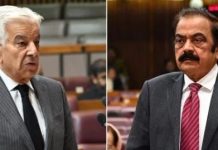ISLAMABAD, NOV 2 – Chief Justice of Pakistan (CJP) Yahya Afridi summoned the first meeting of Judicial Commission on November 5.
The meeting would discuss to establish the secretariat for the Judicial Commission and nomination of judges for constitutional benches in the Supreme Court.
The meeting would be attended by Justice Mansoor Ali Shah, Justice Munib Akhtar and Justice Amin-ud-Din Khan.
Moreover, Law Minister Azam Nazeer Tarar and Attorney-General Mansoor Usman Awan would also attend the meeting.
Advocate Akhtar Hussain would represent the Pakistan Bar council in the meeting.
Senator Farooq Hamid Naek, MNA Sheikh Aftab Ahmad, Roshan Khursheed Bharucha, Senator Shibli Faraz and MNA Omer Ayub Khan would also attend the maiden meeting of JCP.
Earlier in the day, National Assembly Speaker Sardar Ayaz Sadiq nominated five parliamentarians for the formation of Judicial Commission of Pakistan (JCP).
The NA speaker sent the names for the 13-member JCP to the Supreme Court.
Also Read: NA speaker finalises MPs for Judicial Commission of Pakistan
Opposition Leader in the National Assembly Omar Ayub and Pakistan Muslim League-Nawaz (PML-N) MNA Sheikh Aftab were nominated from the National Assembly for the commission.
Moreover, Pakistan Peoples Party (PPP) Senator Farooq H Naek, Opposition Leader in Senate Shibli Faraz and Roshan Khursheed Barocha were also nominated.
Government and opposition have equal representation in the nominations for the JCP.
After the enactment of the 26th amendment in the constitution, five parliamentarians would be included in the judicial commission.
Read More: Imran Khan endorses Omar Ayub, Shibli Faraz for judicial commission
The JCP will appoint judges to the Supreme Court, high Courts and Federal Shariat Court. It will also review and evaluate the performance of high Court judges and prepare their annual performance reports.
NA speaker sent the names to Supreme Court after consulting the Senate chairman and all the parliamentary parties.

















